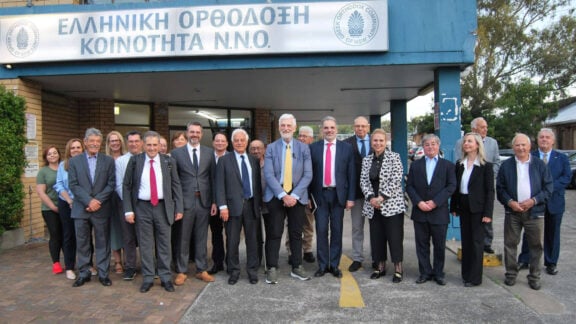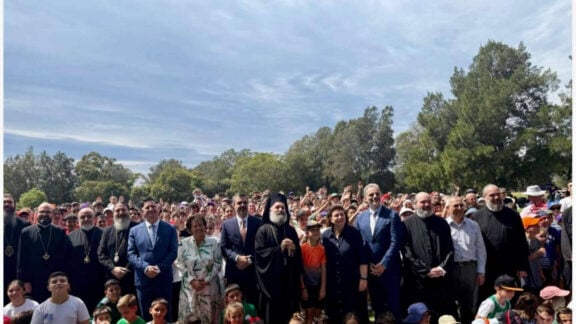The standardisation of an Easter date for all Christian religions would solve many problems for Greek communities in the Antipodes who are prevented from celebrating Easter with the majority of the population, in a spirit of Christian unity and togetherness.
This weekend, Australians kick off the Easter break and enjoy family feasts, while Greeks are left fasting until 2 May. Unlike their Christian counterparts, they will be left to celebrate the holy feast once schools resume. Unfortunately, with more mixed marriages than ever before, families lose sync with the current system of two Paschal observations.
Athena, from the Facebook group Ask an Orthodox Priest, told Neos Kosmos that both she and her husband came from different backgrounds and upbringing. She states for her husband’s family Easter and Christmas were “just another party and presents”. She states that “the whole point of marriage is to walk on the path of God together” and her husband’s decision to embrace Orthodoxy and celebrate the feasts together has made a huge difference.
For those not wishing to convert or fully commit to one religion, the dates mean two Easters cause practical inconveniences.
READ MORE: The Theodorou’s kick off Greek Easter celebrations on channel 10
The differences
The differentiation occurs as a result of the churches diverging in their calculations.
Biblical sources point to the Crucifixion and Resurrection of Jesus Christ occurring at the time of Jewish Passover, celebrated on the first full moon following the vernal equinox. In 325 CE, the Council of Nicaea established that Easter would be held on the first Sunday after the first full moon. From that date onwards, the Easter date depended on the ecclesiastical approximation of the equinox.
Pedro Sarsama, a student of Applied Orthodox Theology and Iconography at the Antiochian House of Studies, states “East and West use different calculations for when the equinox is supposed to be and when the full moon following the equinox are supposed to be. Both are incorrect relative to actual astronomical phenomena. Both are incorrect relative to actual astronomical phenomena. The Orthodox world specifically opted to continue celebrating Pascha in unity during the period of calendar reform about a hundred years ago. Jerusalem would not adopt a new Paschalion so nobody adopted it for the sake of unity (except Finland, but only because the state requires them to keep the Gregorian Paschalion and that was apart from the issue of calendar reform).”
Mr Sarsama said that the idea that Pascha is linked to Jewish Passover is a misconception as “before the Julian calendar drifted as much as it has, Pascha and Jewish Passover could fall on the same day – and indeed did so regularly. The canonical stipulation is that we do not tie the date of Pascha to the date of Jewish Passover.”
He states that “if both churches used the same solar calendar (Gregorian or Julian) but still relied on their current calculated lunar cycles, we’d still have different dates”.
As it is, all Christians will celebrate together in 2025 and from there, the difference in the Easter dates of the two denominations will widen by some years until 2700AD. From there, the celebration of Easter for Greek Orthodox Christians and Catholics will never coincide again.
READ MORE: In the beginning was the (Greek) Word – Christianity’s Hellenistic origins
Aligning dates
A growing number of Christians would like to see the Easter dates aligned but, though many believe that dates are not ‘integral’ to our faith, changing the date would not be a simple matter.
George Vassilopoulos, who lives in Hong Kong states “Orthodoxy should change and be in step with everyone else in the world” or at least with the majority and does not believe this would change the original narrative. “Bring us in line with the West,” he said.
Many, mainly laypeople, agree with him. Jim Polyzoidis from Wollongong said, “As we pray for the unity we had in the first millennium it would be a great idea to celebrate Easter on the same day. Small step for Orthodoxy, giant leap for unity!”
Fr George Frangos of the Transfiguration of Our Lord, Thomastown, told Neos Kosmos that, in order for “a change of stance to be made it would have to be a unanimous decision of an Ecumenical Council comprised of a representation of every recognized Orthodox Church in the world. This is a very big deal.” It is unlikely that the Orthodox church would budge.
“It’s not a matter of us changing, we never changed right from the inception of Christianity this is the point,” he said.
“The Orthodox Church adheres to the directions the Apostles gave and subsequently the Ecumenical Council . This is what makes our Church unique. It shouldn’t be seen as a detriment.”
Deacon Clint Sharpley points out that it was Rome that initially deviated. “For centuries, Rome used our Easter calculations, used leavened bread for communion, and communed their infants. Then Rome changed,” he said.
Orthodox Christians point to the miracles of Easter which occur within the church. There is the Holy Fire in the Church of the Holy sepulchre in Jerusalem which only happens on the eve of Orthodox Easter, the impressive phenomenon of the descent of a cloud on Mount Tabor on the day of the Transfiguration of the Lord, according to the Julian calendar and the backward flow of the River Jordan on the anniversary of Christ’s baptism.
These miracles have kept the Orthodox religion steadfast.
There are no Easter miracles or phenomenon for Catholicism and there are many who doubt the legitimacy of these fires, very much like those who doubted the Resurrection of Christ.
Looking to the future
Since the Second Vatican Council in 1963, the Vatican has been on board with a proposal to set a common date, and had issued a declaration “on the revision of the calendar” saying council members “would not object if the feast of Easter were assigned to a particular Sunday of the Gregorian calendar”.
Catholic Bishop Brian Farrell told the Catholic News Service this month that “it would be a great thing if all Christians, on the same, celebrated the fundamental truth of our faith. That would be hugely important,” he said, adding that the Vatican would agree to change if other Christians would.
The Pontifical Council for Promoting Christian Unity and the World Council of Churches already are discussing ways to celebrate the 1,700th anniversary of the Council of Nicaea in 2025, the next year when both religions are aligned in their Easter celebrations.
It remains to be seen whether the Vatican will budge.









